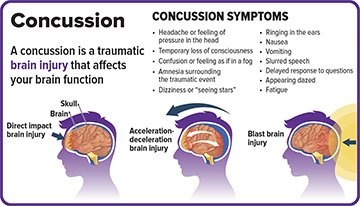News
Care for Concussions
Date: 2020-06-16
June is Brain Injury Awareness Month and in that spirit, we’d like to share some information about one of the most common traumatic brain injuries - concussions.
What is a concussion? Imagine your brain is like gelatin inside your skull. If your head, neck or upper body receives a significant blow or experiences a sudden violent movement, it can cause that gelatin to be shaken up and hit the inside of the skull. This impact can result in a traumatic brain injury called a concussion.
Some of the signs and symptoms of a concussion include:
- Headache
- Dizziness
- Ringing in the ears
- Memory loss
- Nausea
- Light sensitivity
- Drowsiness
- Depression
“A concussion is considered a ‘mild’ traumatic brain injury in the sense that it doesn’t cause internal bleeding, but it does have an effect on your ability to function in the short term,” says Stephanie Schurr, an Occupational Therapist in Neurology Outpatient Services at St. Joseph’s Hospital. Schurr often works with clients who have had concussions. “To a person with a concussion, it doesn’t feel mild, of course.”
If you suspect a concussion, it is important that you be assessed by a healthcare professional for proper diagnosis and treatment. The most common treatment for a concussion is to get a lot of rest and avoid activities that can trigger or worsen symptoms, like doing sports, reading, watching TV or using a computer.
Most people fully recover from a concussion within one to four weeks. Still, about 10 to 20 percent of people experience longer-lasting symptoms,” says Schurr. “If you are one of those people, it’s important to seek follow-up care.”
Schurr, along with a Physiotherapist and a Speech Language Pathologist offer a specialized group program at St. Joseph’s Hospital for adults who are experiencing persistent post-concussion symptoms. The purpose of the program is to educate participants on self-management and self-care techniques and can reduce or eliminate symptoms. Participants also have the benefit of connecting with others experiencing the same issues and challenges.
The program runs for seven sessions (plus an eighth session for family and friends who want to learn more and share their experiences) and is offered two to three times a year. Anyone interested in joining the program must be referred by his or her primary healthcare provider.
Some of the self-management techniques focus on a client’s ability to control their own environment. “For example, a lot of people have sensory sensitivity after concussion: Lights seem brighter and noises seem louder. You can’t turn out all the lights at the grocery store, but, you can wear a baseball cap to shield the light from overhead, wear light coloured sunglasses, or organize your grocery list in such a way that you’re going to be in and out of there as quickly as possible.” added Schurr.
Another important aspect of concussion recovery is the “symptom cycle.” If your head hurts, it can affect your mood - you feel anxious, depressed or grouchy - and you tighten up your muscles to guard against the pain, which can lead to muscle pain and worsen head pain. “What we teach is that if you can intervene at any point in that cycle, you can also improve your ability to cope with symptoms and reduce your symptoms,” says Schurr. “It’s about setting yourself up for success wherever you can, so that each day is a little bit better.”
Although St. Joseph’s Care Group is always “here for you when you need us,” we’d rather see you stay safe and healthy by preventing a concussion if possible. By taking basic safety precautions, you can prevent or reduce the severity of a brain injury:
- Wear proper equipment when participating in sports. A helmet is like having a bumper on your car - it’s an extra buffer so the brain isn’t jostled as easily.
- Buckle-up in the car and make sure that car seats are properly installed.
- Survey your home and outside spaces for hazards and make repairs.
- If you get hurt, seek medical attention.
Have fun and stay safe this summer!

